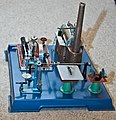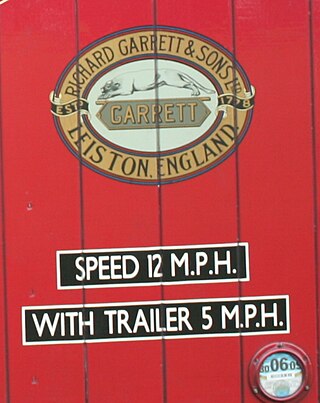
Gebr. Märklin & Cie. GmbH or Märklin is a German toy company. The company was founded in 1859 and is based at Göppingen in Baden-Württemberg. Although it originally specialised in doll house accessories, today it is best known for model railways and technical toys. In some parts of Germany and in Sweden, the company's name is almost synonymous with model railways.

A traction engine is a steam-powered tractor used to move heavy loads on roads, plough ground or to provide power at a chosen location. The name derives from the Latin tractus, meaning 'drawn', since the prime function of any traction engine is to draw a load behind it. They are sometimes called road locomotives to distinguish them from railway locomotives – that is, steam engines that run on rails.
Bassett-Lowke was an English toy manufacturing company based in Northampton. Founded by Wenman Joseph Bassett-Lowke in 1898 or 1899, the company specialized in model railways, boats and ships, and construction sets. Bassett-Lowke started as a mail-order business, although it designed and manufactured some items.

A steamroller is a form of road roller – a type of heavy construction machinery used for leveling surfaces, such as roads or airfields – that is powered by a steam engine. The leveling/flattening action is achieved through a combination of the size and weight of the vehicle and the rolls: the smooth wheels and the large cylinder or drum fitted in place of treaded road wheels.

De Dion-Bouton was a French automobile manufacturer and railcar manufacturer operating from 1883 to 1953. The company was founded by the Marquis Jules-Albert de Dion, Georges Bouton, and Bouton's brother-in-law Charles Trépardoux.
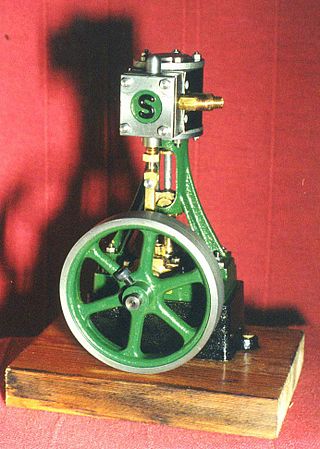
Model engineering is the pursuit of constructing proportionally-scaled miniature working representations of full-sized machines. It is a branch of metalworking with a strong emphasis on artisanry, as opposed to mass production. While now mainly a hobby, in the past it also had commercial and industrial purpose. The term 'model engineering' was in use by 1888. In the United States, the term 'home shop machinist' is often used instead, although arguably the scope of this term is broader.

Live steam is steam under pressure, obtained by heating water in a boiler. The steam may be used to operate stationary or moving equipment.

A hexamine fuel tablet is a form of solid fuel in tablet form. The tablets burn smokelessly, have a high energy density, do not liquefy while burning and leave no ashes. Invented in Murrhardt, Germany, in 1936, the main component is hexamine, which was discovered by Aleksandr Butlerov in 1859. Some fuel tablets use 1,3,5-trioxane as another ingredient.

Mamod is a toy manufacturer based in Britain that specializes in producing live steam models. The company was founded in Birmingham in 1937 by Geoffrey Malins. The name "Mamod" is a combination of "Malins Models." Initially, the company manufactured stationary steam engines, which were originally sold under the 'Hobbies' brand. Subsequently, Malins introduced the brand name 'Mamod.' Over time, Mamod expanded its range to include models of road rollers, traction engines, steam wagons, and other steam-powered road vehicles. These models were primarily intended for the toy market and were designed to be user-friendly and operate at low boiler pressures for safety, although they were not precise scale models.
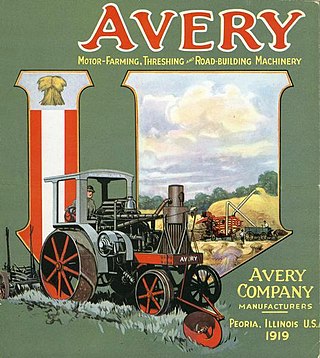
The Avery Company, founded by Robert Hanneman Avery, was an American farm tractor manufacturer famed for its undermounted engine which resembled a railroad engine more than a conventional farm steam engine. Avery founded the farm implement business after the Civil War. His company built a large line of products, including steam engines, beginning in 1891. The company started with a return flue design and later adapted the undermount style, including a bulldog design on the smokebox door. Their design was well received by farmers in central Illinois. They expanded their market nationwide and overseas until the 1920s, when they failed to innovate and the company faltered. They manufactured trucks for a period of time, and then automobiles. until they finally succumbed to an agricultural crisis and the Depression.

The Antique Gas & Steam Engine Museum (AGSEM) is a living-history museum founded in 1969 located on 55 acres (220,000 m2) of county-owned land on the outskirts of Vista, California. The museum is a non-profit 501c(3) organization. It is located at 2040 N Santa Fe Ave. in Vista. It is run by several paid employees, along with volunteer help.

J & L Randall Ltd was a British toy manufacturer, based in Potters Bar, which was in Middlesex until 1965 and then in Hertfordshire. The company flourished in the 1950s and 1960s and placed regular advertisements in Meccano Magazine. It was one of the main competitors to Mamod for models of stationary steam engines.

Straker-Squire was a British automobile manufacturer based in Bristol, and later Edmonton in North London.

MAHLE GmbH is a German automotive parts manufacturer based in Stuttgart, Germany. It is one of the largest automotive suppliers worldwide. As a manufacturer of components and systems for the combustion engine and its periphery, the company is one of the three largest systems suppliers worldwide for engine systems, filtration, electrics, mechatronics, and thermal management. In 2018, Mahle GmbH sales amounted to over €12.5 billion.
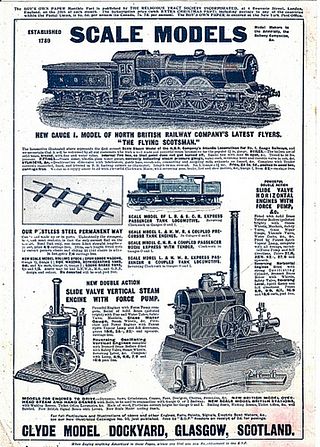
The Clyde Model Dockyard was a famous toy and model shop in Glasgow. Established in 1789, it was located at 22–23 Argyll Arcade. The firm manufactured a range of boats and sailing yachts, but were probably best known for their 0 scale model railway stock and accessories.

A model steam engine is a small steam engine not built for serious use. Often they are built as an educational toy for children, in which case it is also called a toy steam engine, or for live steam enthusiasts. Between the 18th and early 20th centuries, demonstration models were also in use at universities and engineering schools, frequently designed and built by students as part of their curriculum.
Jensen Steam Engines is a manufacturer of model/toy steam engines, located in Jeannette, PA USA. Established in 1932 by Tom Jensen Sr. They are still making steam engines using traditional technology and methods.

The Workshops Rail Museum is a railway museum in Ipswich, Queensland, located within the former North Ipswich Railway Workshops.
Stuart Turner Ltd is a British engineering company, based in Henley-on-Thames, Oxfordshire, England, founded by engineer Sidney Marmaduke Stuart Turner in 1906.




